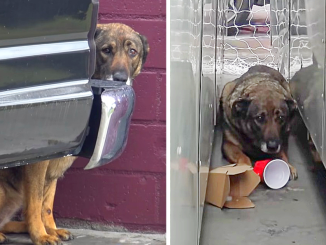
Meet Honey, This is the poor soul Dumaguete Animal Sanctuary rescued today. Honey was dumped in severe condition with the biggest tumor on her face. She was in discomfort for a long time since she was swollen and infected.

” We are with her now at Animal Wellness getting X-rays to find out if this mass is treatable. Her early blood tests revealed that her organs were working OK, but she is anemic. She was also found to have heartworm.
They will put her on anti-inflammatory for 2 weeks and also work on raising her red blood cell count. She will then require surgery and chemotherapy. She stands a high chance of living a regular, happy life!

She need to do surgery to remove the mass, followed by chemo if it is cancerous. Given the position of the tumour, surgeons will need to do the procedure at Animal Wellness, where they have gas anaesthetic, giving Honey the highest chance of survival.

Her red blood cell count is still low after 15 days in the center, therefore she will have a transfusion. Hopefully, surgery will be performed soon after.
“Day 17: Honey’s operation has just begun. Just before she was sedated, she was photographed with Rina and Rudylyn. We will do the procedure at Animal Wellness since gas anaesthesia is safer for more serious instances. Because the tumor is so close to her brain, the procedure will be lengthy and complicated.

Day 19: Honey’s surgery was as successful as it could be given that the tumor had grown around so many of her facial and optical nerves. Unfortunately, the nerves controlling her left eyelid had to be severed, leaving her with a little droop.

The tumor was huge, and as a result the surgical wound is large. She is eating chicken which is a good sign. She will be able to live a normal life even without it. She is already eating on her own, but her face is still swollen from the operation and inflammation, so doctors are hopeful she will eat more once that subsides.

She is still in the very early stages of recovery from such an invasive surgery, and each day she survives without complications, is a blessing. She made it through the procedure!!! Honey is still deemed critical, but she is awake and breathing.
“We just had the results of Honey’s tumor biopsied and unfortunately it’s malignant. Doxorubicin is the most effective chemotherapy treatment for the type of cancer she has. We must act quickly to halt the spread of any cancer that may still be present in Honey’s system.”
She hadaother tumor in her vagina but the amazing news is that the tumor in her vagina has shrunk by 60 percent since she started chemo and she has only had two sessions so far.
After more than 3 months, she’s gaining weight and is generally in good spirits despite being on chemo. Her prognosis is still uncertain because chemo affects the organs, but we are confident she will recover completely.
Dogs actually do respond better when their owners use cute ‘baby talk’, study finds
Dogs’ brains are sensitive to the familiar high-pitched “cute” voice tone that adult humans, especially women, use to talk to babies, according to a new study.
The research, published recently in the journal Communications Biology, found “exciting similarities” between infant and dog brains during the processing of speech with such a high-pitched tone feature.
Humans tend to speak with a specific speech style characterised by exaggerated prosody, or patterns of stress and intonation in a language, when communicating with individuals having limited language competence.
Such speech has previously been found to be very important for the healthy cognitive, social and language development of children, who are also tuned to such a high-pitched voice.
But researchers, including those from the Eötvös Loránd University in Hungary, hoped to assess whether dog brains are also sensitive to this way of communication.
In the study, conscious family dogs were made to listen to dog, infant and adult-directed speech recorded from 12 women and men in real-life interactions.
As the dogs listened, their brain activities were measured using a functional magnetic resonance imaging (fMRI) scan.
The study found the sound-processing regions of the dogs’ brains responded more to dog- and infant-directed than adult-directed speech.
This marked the first neurological evidence that dog brains are tuned to speech directed specifically at them.
“Studying how dog brains process dog-directed speech is exciting, because it can help us understand how exaggerated prosody contributes to efficient speech processing in a nonhuman species skilled at relying on different speech cues,” explained Anna Gergely, co-first author of the study.
Scientists also found dog- and infant-directed speech sensitivity of dog brains was more pronounced when the speakers were women, and was affected by voice pitch and its variation.
These findings suggest the way we speak to dogs matters, and that their brain is specifically sensitive to the higher-pitched voice tone typical to the female voice.
“Remarkably, the voice tone patterns characterizing women’s dog-directed speech are not typically used in dog-dog communication – our results may thus serve evidence for a neural preference that dogs developed during their domestication,” said Anna Gábor, co-first author of the study.
“Dog brains’ increased sensitivity to dog-directed speech spoken by women specifically may be due to the fact that women more often speak to dogs with exaggerated prosody than men,” Dr Gabor said.




Leave a Reply